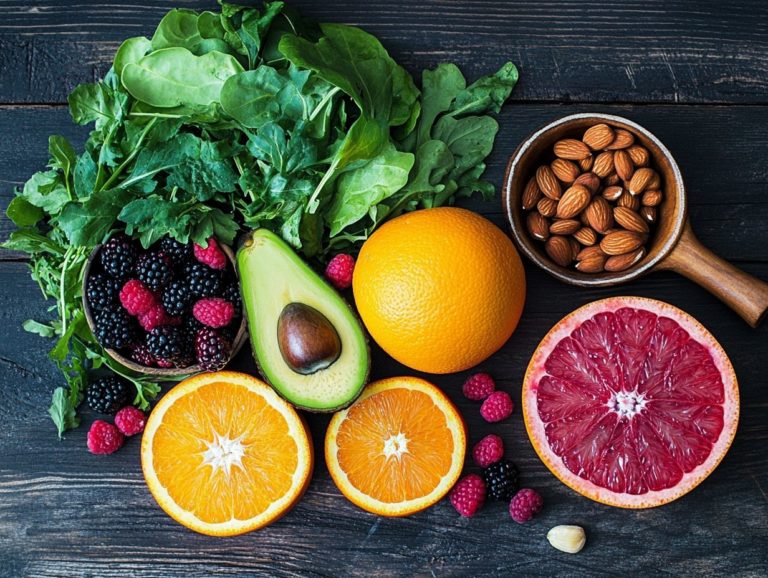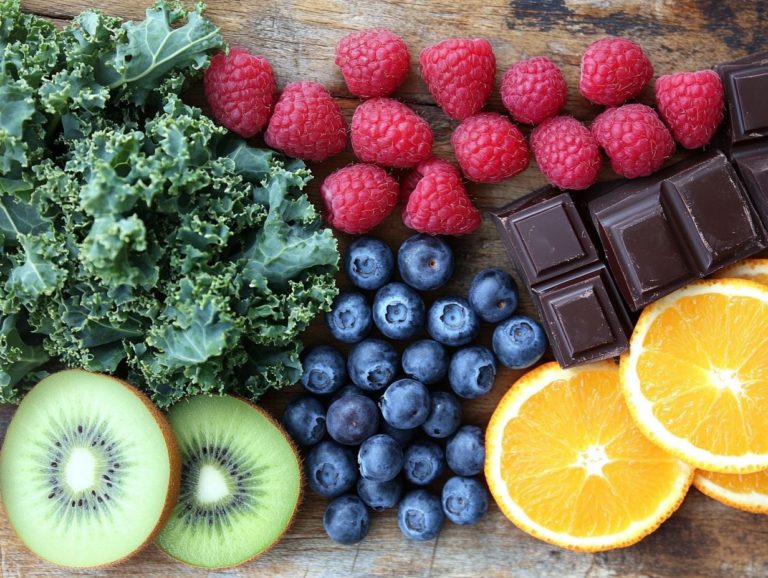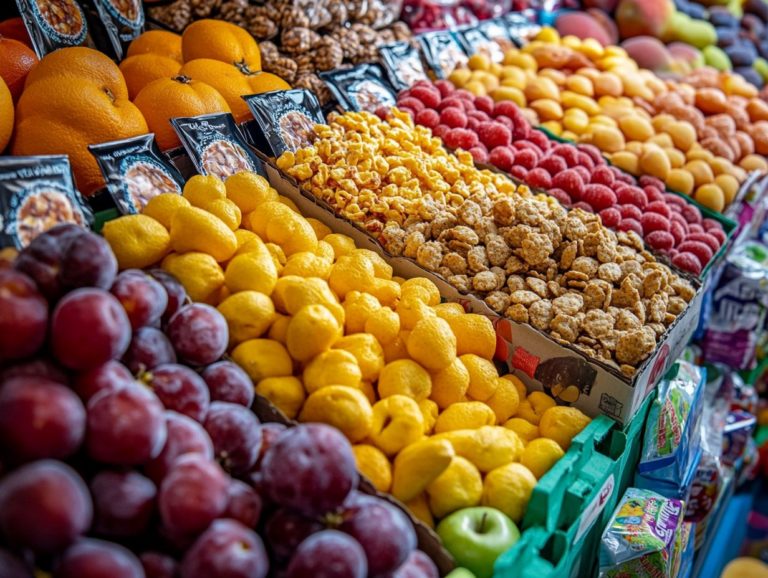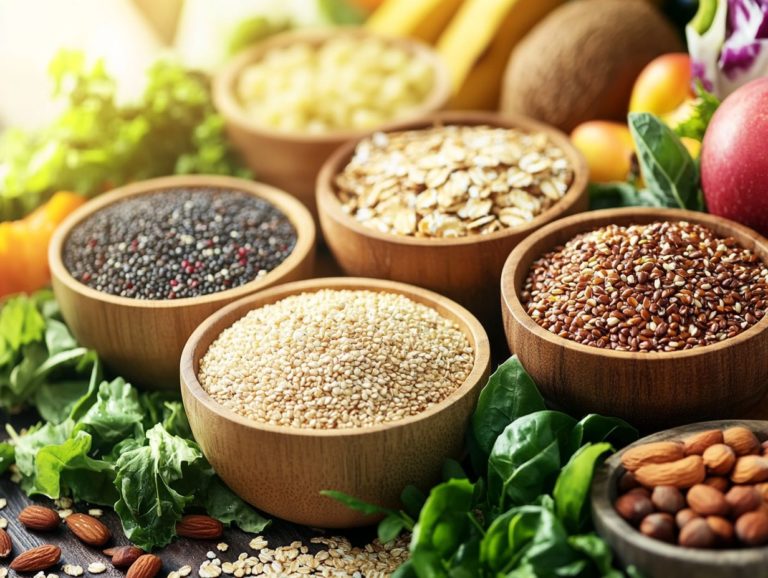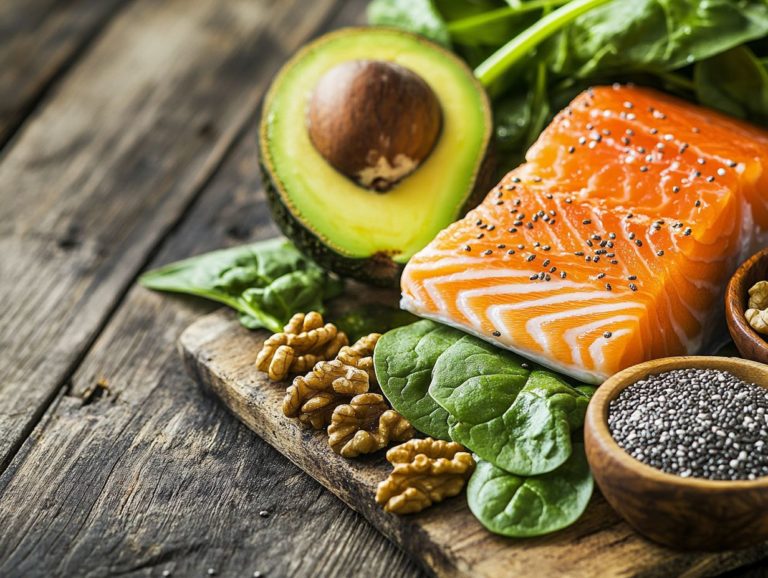Navigating Special Diets: Gluten-Free and Beyond
In today s health-conscious world, understanding special diets is vital. From gluten-free to vegan, these choices can greatly influence your well-being.
This article explores the essence of special diets. It highlights the benefits of gluten-free living, especially for digestive health.
Learn how to navigate the landscape of special diets and make informed choices that benefit your health!
Contents
- Key Takeaways:
- Understanding Special Diets
- Benefits of a Gluten-Free Diet
- Other Types of Special Diets
- Tips for Navigating Special Diets
- Frequently Asked Questions
- What is a gluten-free diet and who should follow it?
- What are some common substitutes for gluten-containing foods?
- Are there any health benefits to following a gluten-free diet?
- Can I still eat out at restaurants while following a gluten-free diet?
- What are some hidden sources of gluten to watch out for?
- Is it possible to follow a gluten-free diet on a budget?
Key Takeaways:
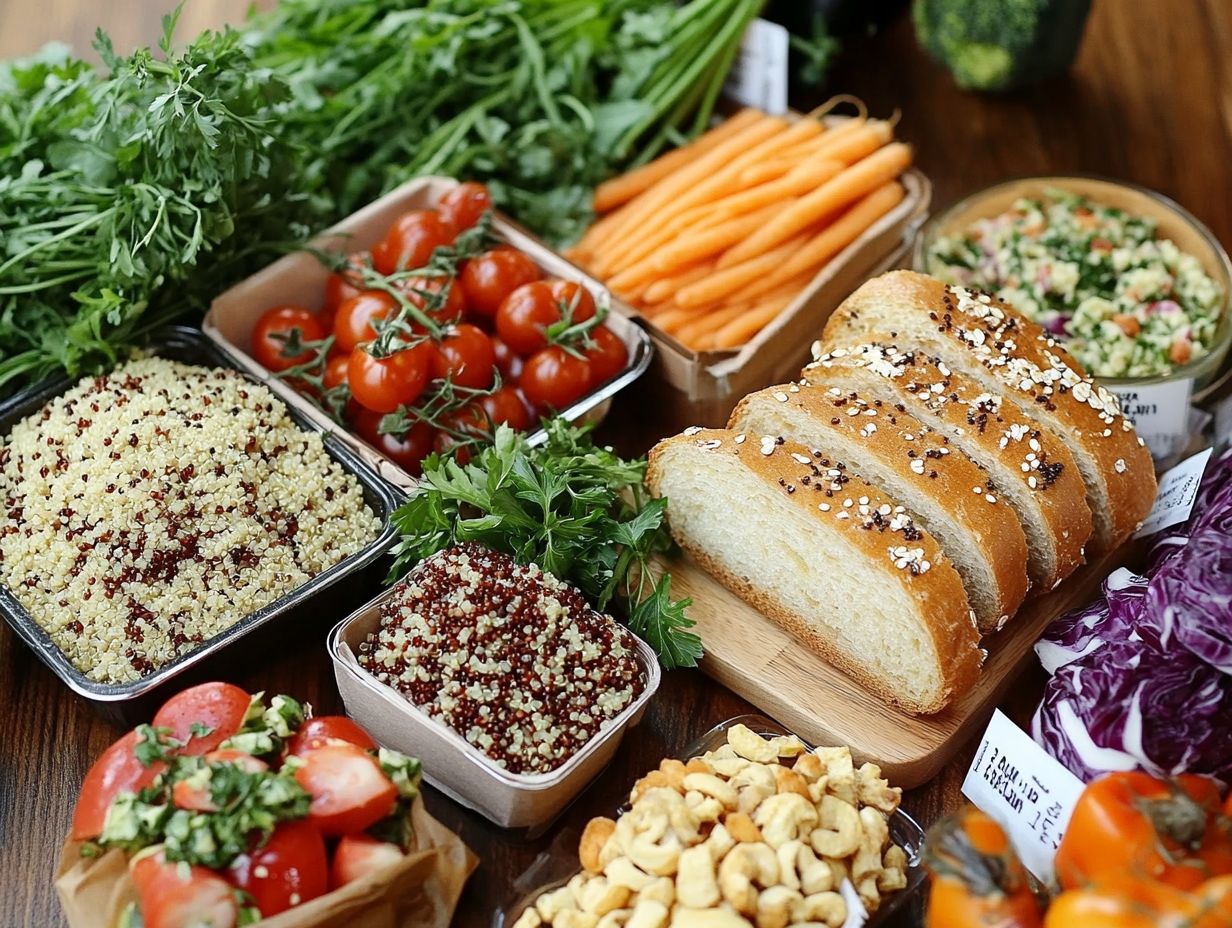
- A gluten-free diet can improve digestive health and may reduce inflammation and improve energy levels.
- Special diets like dairy-free, vegan, and keto can positively impact health. However, consult with a healthcare professional before making major dietary changes.
- Meal planning and communicating with family can make navigating special diets easier.
Understanding Special Diets
Understanding special diets is important for a healthy lifestyle, especially for those with specific needs like celiac disease or gluten sensitivity. These dietary options can enhance your nutrient absorption and overall well-being.
Special diets, whether gluten-free, dairy-free, vegan, or others, are designed to address unique health concerns. This guide will give you valuable insights into these diets, focusing on gluten-free options and the importance of gluten awareness.
What are Special Diets?
Special diets are tailored nutritional plans that meet specific health needs. If you need a gluten-free lifestyle, this is crucial to manage conditions like celiac disease.
These adjustments also apply to those with diabetes, where keeping track of carbs and balanced meal planning help regulate glucose levels. If you’re managing hypertension, a low-sodium diet can improve your condition.
Each strategy addresses health concerns and enhances your overall well-being through informed food choices. By understanding the requirements of various health conditions, you can ensure your meals are both enjoyable and rich in essential nutrients.
Benefits of a Gluten-Free Diet
The benefits of a gluten-free diet go beyond just avoiding gluten. This diet is essential for enhancing digestive health, especially for those with celiac disease or gluten sensitivity.
By removing gluten, you may see a significant reduction in digestive issues and improved nutrient absorption. This shift can greatly alleviate symptoms associated with celiac disease.
Gluten-free meals can also be nutritious and delightful, offering a variety of options to support your health journey.
Improving Digestive Health
A gluten-free diet can significantly improve your digestive health. This is especially true for those dealing with celiac symptoms or gluten sensitivity.
Cutting out gluten grains, like wheat, barley, and rye, may relieve chronic digestive issues. This includes bloating, gas, and diarrhea.
Research shows that a gluten-free lifestyle can enhance your gut health. It reduces inflammation and promotes a healthy microbiome, which is key to overall wellness.
Other Potential Benefits
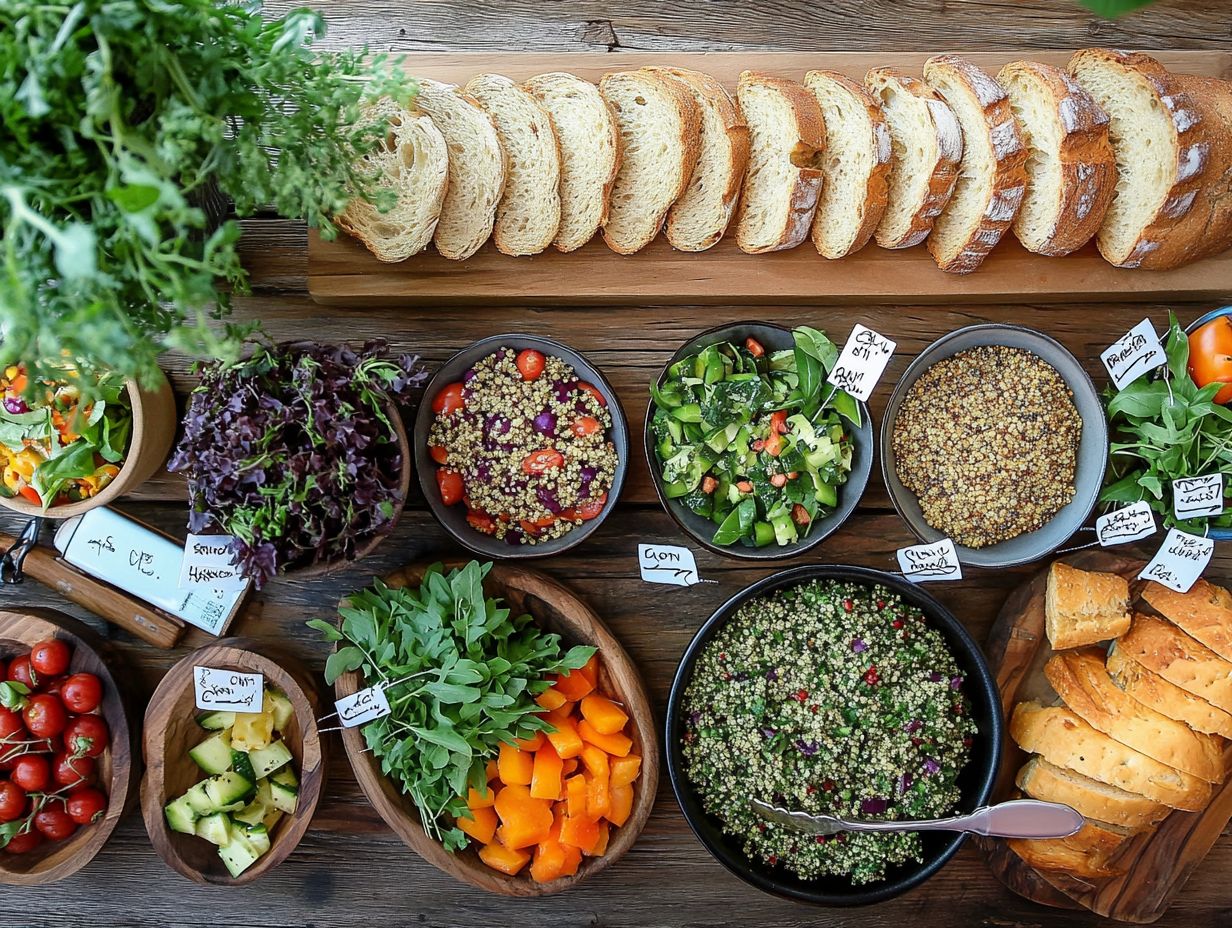
A gluten-free diet does more than improve digestive health. It provides various benefits that can enhance your lifestyle, especially for those with autoimmune disorders or chronic diseases.
Switching to a gluten-free diet can significantly boost your energy levels. You’ll likely feel more lively and engaged throughout the day.
These dietary changes are crucial for improving your overall health. They can stabilize blood sugar levels and reduce inflammation, both vital for managing chronic conditions.
A gluten-free lifestyle can improve your mental clarity and emotional well-being. It’s a holistic approach to health that extends beyond just avoiding gluten.
Other Types of Special Diets
There are many special diets beyond gluten-free ones. These diets cater to specific health needs and personal preferences.
Dairy-Free
A dairy-free diet eliminates all dairy products. It’s essential for those who are lactose intolerant or exploring alternative options.
This shift isn’t just about avoiding discomfort. It’s a chance to find healthier snack alternatives and expand your nutrition.
Adopting a dairy-free lifestyle allows you to include a variety of plant-based foods. Options like almond milk, coconut yogurt, and cashew cheese are nutritious substitutes.
Eating more fruits, vegetables, legumes, and nuts can create a balanced diet. This provides a delightful variety of flavors and textures for enjoyable meals.
Vegan
A vegan diet is completely plant-based and excludes all animal products. It offers numerous health benefits while promoting sustainability.
This dietary choice encourages you to explore a wide variety of fruits, vegetables, grains, nuts, and seeds. This leads to better heart health and weight management.
Living a vegan lifestyle isn t just about personal health. It also supports environmental sustainability by reducing the ecological impact of animal agriculture.
While adopting this lifestyle, you’ll discover creative ways to get essential nutrients like protein.
Foods like legumes, tofu, quinoa, and leafy greens can provide all the nutrition you need. A balanced and fulfilling diet is achievable without any animal products.
Keto
The keto diet presents a low-carb dietary approach that emphasizes high-fat consumption, tailored to enhance weight management and promote a healthier lifestyle.
By significantly cutting down on carbohydrates and ramping up the intake of fats, you may enter a metabolic state known as ketosis. This transition encourages your body to burn fat for energy instead of relying on glucose, leading to improved fat loss and, ultimately, weight reduction.
Numerous studies indicate that sticking to this regimen could offer additional health perks, such as enhanced mental clarity and a potential decrease in inflammation. Embracing this dietary shift not only supports your weight goals but also fosters better overall health.
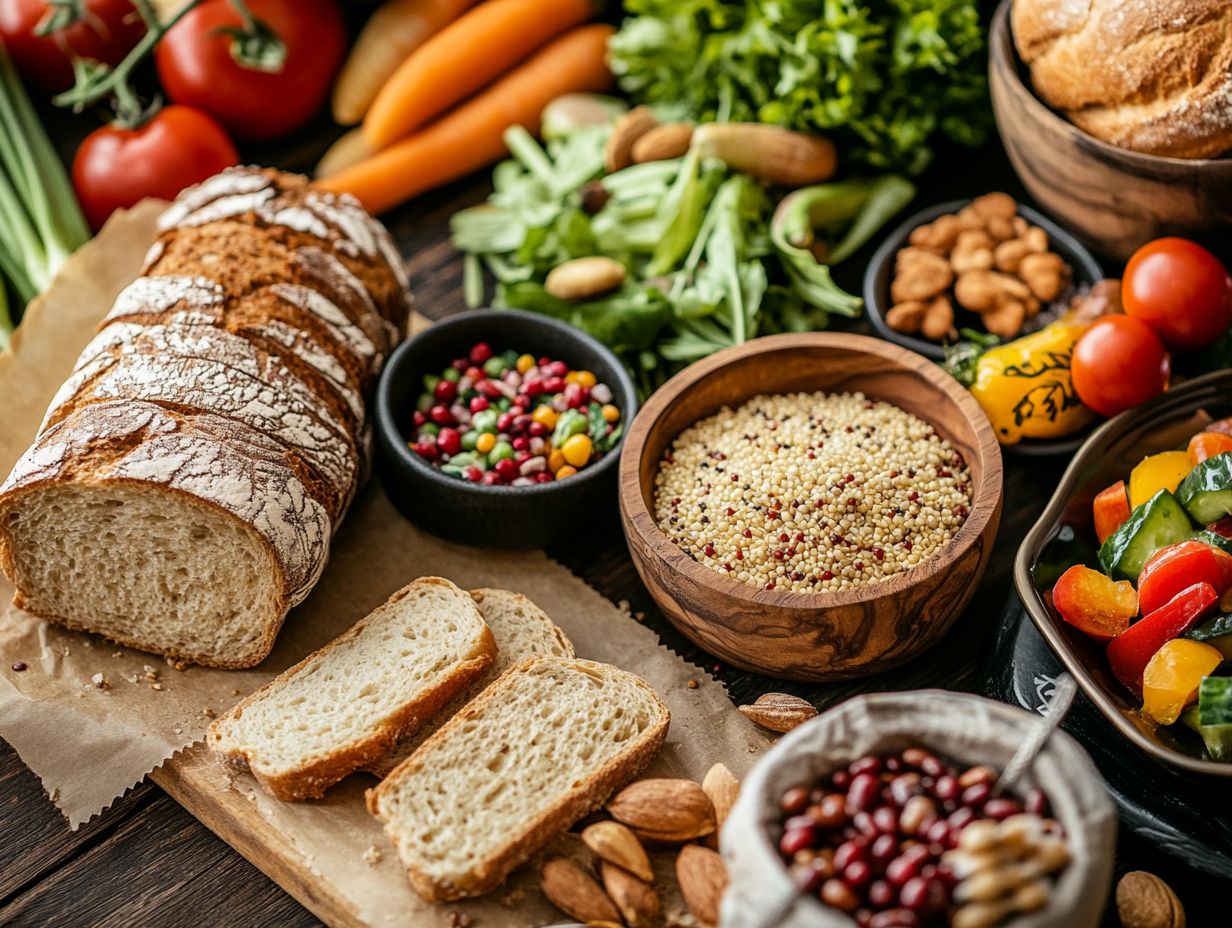
Navigating special diets may seem daunting, but with the right strategies for meal planning and grocery shopping, you can effortlessly manage your dietary needs while savoring healthy snacks.
Meal Planning and Grocery Shopping
Effective meal planning and grocery shopping are essential for anyone adhering to a special diet, especially when it comes to ensuring the selection of safe and nutritious gluten-free products.
By dedicating time to create a structured meal plan, you can transform your grocery shopping experience into something efficient and cost-effective. This strategy helps you avoid sneaky impulse purchases and ensures that you re selecting only gluten-free items.
Always keep a keen eye on food labels they are your best allies, providing crucial information about potential allergens and hidden sources of gluten. Knowing food safety principles helps you avoid cross-contamination and spoilage.
Being an informed shopper gives you the power to make healthier choices that align seamlessly with your dietary goals.
Handling Social Situations
Social situations can be tricky when you have special dietary needs, but there’s a way to enjoy them! With the right strategies, you can communicate your requirements effectively while fostering gluten awareness.
By proactively sharing your dietary preferences with hosts ahead of time, you can help ensure that suitable gluten-free options are available. Engaging openly in conversations about food fosters a deeper understanding among your friends and family regarding the significance of these dietary restrictions.
Leveraging community support like local gluten-free groups or online forums can provide you with valuable resources and actionable tips for handling menus or event invitations.
Ultimately, making mindful eating choices in social settings not only enhances your experience but also promotes a culture of inclusivity, where everyone can enjoy the celebration without any worries.
Frequently Asked Questions
What is a gluten-free diet and who should follow it?
A gluten-free diet excludes gluten, a protein found in wheat, barley, and rye. This diet is primarily recommended for individuals with celiac disease or gluten sensitivity.
What are some common substitutes for gluten-containing foods?
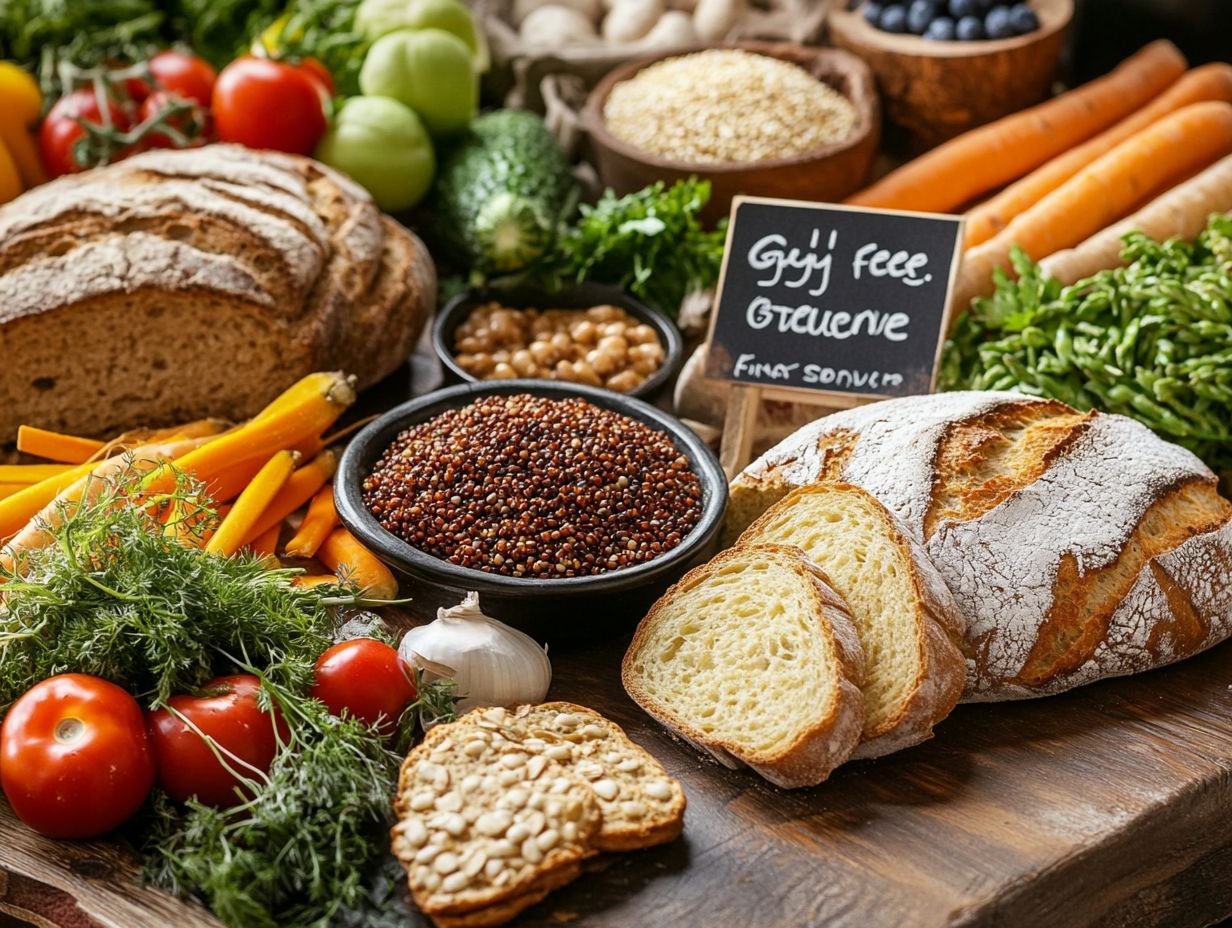
Some common substitutes for gluten-containing foods include rice, quinoa, corn, almond flour, and gluten-free oats. Always check food labels and look for certified gluten-free products.
Are there any health benefits to following a gluten-free diet?
There is no evidence to suggest that a gluten-free diet is inherently healthier for individuals without celiac disease. However, it may lead to weight loss and improved digestion for some individuals due to the elimination of processed foods.
Can I still eat out at restaurants while following a gluten-free diet?
Yes, many restaurants now offer gluten-free options on their menus. It is important to communicate your dietary needs with the staff and ask questions about food preparation to avoid cross-contamination.
Act now to start your dietary journey and explore more resources for managing special diets!
Hidden sources of gluten can be sneaky. Watch out for soy sauce, marinades, salad dressings, and even certain medications and supplements.
Always read labels carefully. Choosing gluten-free products helps you avoid potential sources of gluten!
Is it possible to follow a gluten-free diet on a budget?
Absolutely! Following a gluten-free diet on a budget is entirely doable.
Focus on whole foods like fruits, vegetables, and lean proteins. Buying in bulk and cooking at home saves you money!


